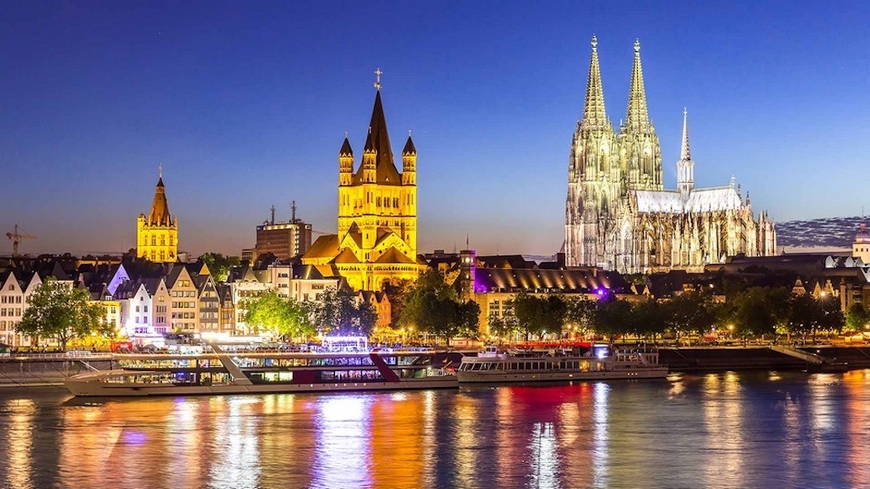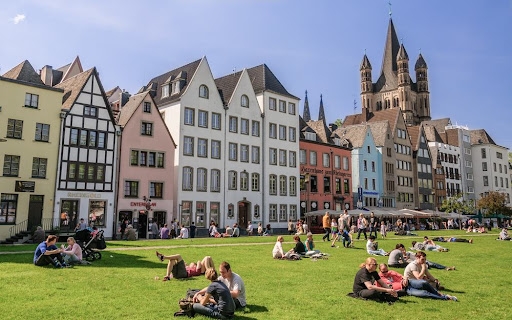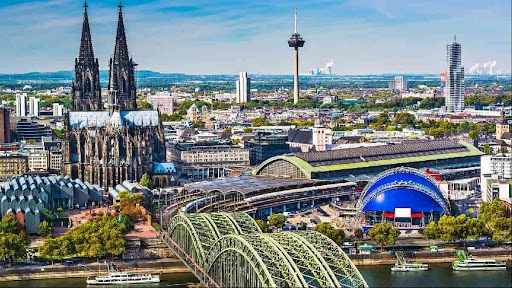Study in Germany: Digital Media and Intercultural Communication



Learn Abroad with CLA during Summer 2024
Study digital media and intercultural communication in Cologne, one of Europe's key industrial centers and Germany's home for public and private media.
-
JOUR 3551: The Business of Digital Media
-
COMM 3451: Intercultural Communication: Theory & Practice
For University of Minnesota undergraduates
No language requirement
Instructor-led program
This program is administered by the College of Liberal Arts.
Program Dates
You can express interest in CLA's Cologne Summer '24 Program now by submitting the interest form. (When it becomes available, a link to the program application will be provided to students who submit the interest form.)
June 17 to July 5
Courses
This course meets the Technology and Society theme requirement.
Instructor: Diane Cormany
Digital media enterprises are shaped by their cultural context and regulations about data privacy, content moderation, economic models and more. Understanding how other countries imagine the role of media and the protection of audiences helps illuminate the United States systems. This course will consider German media and European Union regulations in contrast to U.S. digital media enterprises.
Learn to analyze and evaluate the economic strategies of existing digital media firms across various sectors of society including news, entertainment, social media, and mobile. Assess their impacts on cultural and civic life for better and for worse. Use these skills to incubate your own ideas for the media innovations of the future.
Instructor: Ascan Koerner
This course is about effective intercultural communication, in general and in German business settings specifically. The course combines theoretical knowledge about how culture affects communication with the lived experience of being in a foreign country and culture. It also explicates the different impacts that proximal (i.e., business) and distal (i.e., German) cultures have vis a vis proximal (identity) and distal (nationality) personal characteristics. To this end, the course makes equal use of theoretical, experiential, and immersive learning.
Students will discover themselves and their cultural contexts in a number of experiential learning experiences that are designed around producing specific insight into interpersonal, small group, and intercultural communication. The course included several site visits with German employers, giving students intimate insights into German businesses.
Program Details
Cologne, more than 2,000 years old, is Germany's fourth largest city and a major industrial and cultural center. For centuries, Cologne has been a major trading hub and today is home to Germany's largest public and private broadcaster, making it Germany’s Media City. It also boasts major multinational manufacturing and industrial companies. This vibrant city is the ideal backdrop to study German digital media, business culture, and communication.
Located in the heart of Northern Europe, Cologne gives students access to public transportation, a compact and walkable city, and a centralized location for train rides; in less than four hours you can get an authentic croissant in Paris, see Big Ben in London, or wander the canals of Amsterdam.
Students will live together in a dormitory that includes a communal kitchen and outdoor spaces for socializing. Classes will be held at Bürgerhaus Stollwerck, which is in a bustling neighborhood called Suedstadt that has a great number of cafes, snack bars, restaurants, and pubs as well as stores, supermarkets, galleries, public parks, etc.
The program is expected to include:
- Overnight trip to Brussels, including a visit to the EU Parliament and the Atomium
- Guided tour of the Cologne Cathedral Roof
- Guided tour of the Nazi Documentation Center
- Team day at a ropes course
- Visit to a typical German castle
The program cost is estimated at $5,500, including housing/meals. Travel to and from Cologne is an additional cost.
CLA students who are accepted to the program are automatically considered to receive CLA Learning Abroad Scholarship based on financial need.
All participants will need a passport. If you do not have a passport, or your passport expires less than 3 months after your return date from your time abroad, apply for a new passport now and pay for expedited processing to make sure it arrives in time.
A visa is a document that proves that travel into a particular country has been approved by their governing body. U.S. citizens do not need a visa for visits up to 90 days for tourism in Germany or Belgium. Non-U.S. passport holders should check with the German and Belgian consulates regarding visa requirements and fees. If you carry a passport other than a U.S. passport and are required to carry a visa into Germany or Belgium, you will be responsible for securing your visa and should consult with the Program Manager (Ascan Koerner) to make sure you have any University-specific documentation that you need.
Contact
Questions about this program can be directed to Ascan Koerner at koern011@umn.edu.